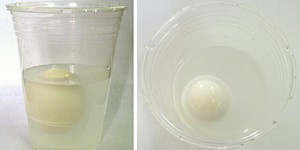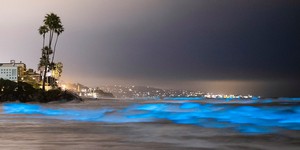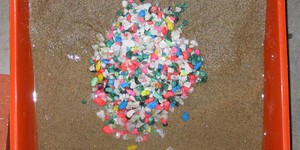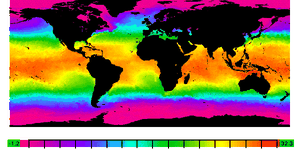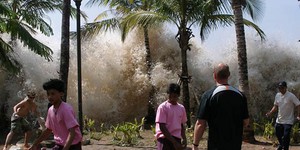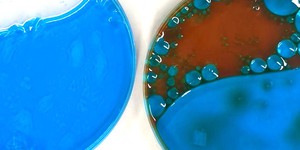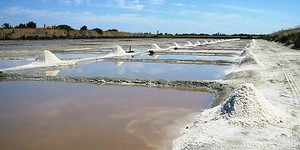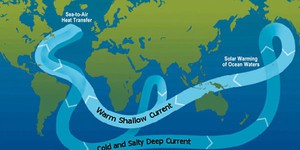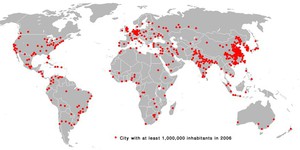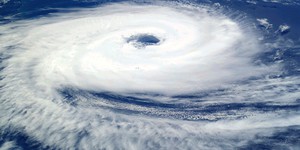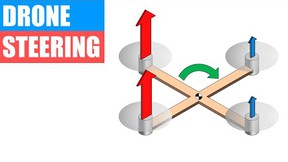Ocean Sciences Science Projects (18 results)
About 70% of Earth's surface is covered by oceans but humans have only explored 5% of the ocean! From microscopic phytoplankton to pods of whales and global weather patterns there is a lot left to discover.
|
Select a resource
Coding Projects
Sort by
|
Some objects float on top of the ocean, and other objects sink to the bottom. Why? Try this eggsperiment to find out!
Read more
Imagine the ocean water turning bright red or seeing ocean waves glowing a beautiful blue color. Sounds impossible—but it is not! Red tides and glowing waves are caused by microscopic organisms living in the ocean called dinoflagellates. Some dinoflagellates have the ability to produce light through a process called bioluminescence. When and how do these organisms glow? In this science project, you will investigate how changing the dinoflagellate's exposure to light and dark affects its…
Read more
New
How do you feel right now? Do you remember how you felt a few hours ago? How about yesterday or last Wednesday? What if you could track your emotions throughout the day and use this information to help improve your mood and well-being? In this science project, you will program a simple, pocket-sized device that you can carry around with you to log your feelings whenever you want or on a specific schedule.
Read more
A day at the beach is a wonderful way to spend time with your family and friends. You can swim, play games, and build sand castles. But have you ever thought about how all of that sand got there and wondered why the shoreline weaves in and out of the ocean? In this science project, you will investigate how ocean waves build beaches by making a model of the beach and shoreline. All you need is a tiny surfer and a beach volleyball court for your model, and you can imagine that you are in…
Read more
Of course it can, you say: ice is water and ice floats! And you're right. But we're talking about water in the liquid phase (the title reads better without getting overly specific). So how about it? Can liquid water float on water? Check out this project to find out.
Read more
A tsunami is a series of waves made in a body of water, like the ocean, that can cause serious destruction when they hit the coastline. In deep water, a wave can be just a few feet high and travel very fast. As it nears the coastline, and moves into shallower water, tsunamis usually slow down, but the wave height can grow to 100 feet! In this ocean science project, you will model a tsunami and investigate how wave velocity (speed) depends on water depth. Does it match the mathematical equation…
Read more
New
Have you ever walked next to your favorite ocean, lake, or creek and seen plastic waste everywhere? Have you ever thought about how much plastic breaks down into microplastics and pollutes waterways? Scientists are coming up with new ways to remove these microplastics from our waterways, and now you can test them out for yourself at home.
Read more
The oceans are a precious natural resource, part of Earth's carbon cycle. But what happens if the oceans absorb too much carbon dioxide? Many scientists are concerned that the increased absorption of carbon dioxide is causing them to become more acidic. What impact does that have on the marine life? In this ocean science fair project, you will demonstrate ocean acidification and investigate the effect on the shells of marine life.
Read more
Have you ever been swimming at the beach and gotten some water in your mouth by mistake? Then you know that the ocean is very salty. But what about other bodies of water? How much salt do they have compared to the ocean?
Read more
Ocean currents have profound effects on the climates of the continents, especially those regions bordering on the ocean. For example, the Gulf Stream (a warm current that goes around the North Atlantic Ocean) is thought to make northwest Europe much warmer than it would otherwise be. Similarly, the California Current is thought to keep Hawaii cooler than other land masses at the same latitude as it. In this ocean science fair project, you will model the behavior of these "rivers" of hot and…
Read more
If you leave an ice cube out on the kitchen counter and come back to check on it in awhile, what do you find? A puddle! The same thing happens to ice in nature—if the temperature gets warm enough, it melts. In this ocean science project, you will find out what happens to sea levels if the ice at the North Pole melts, or if the ice at the South Pole melts. It is an important question for the millions of people who enjoy living along the coasts of the world.
Read more
We've all heard that hurricanes draw their immense power from warm ocean waters. Of course, many factors contribute to the formation and growth of a hurricane, but can we expect to find that the warmer the water, the stronger the hurricane will be? This project shows you how to use online data archives to investigate this question.
Read more
|

